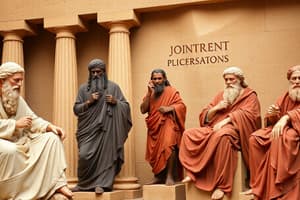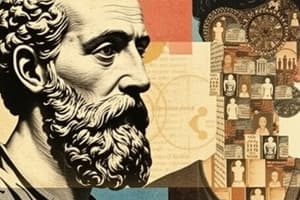Podcast
Questions and Answers
Which philosopher believed that all things are made up of air?
Which philosopher believed that all things are made up of air?
- Heraclitus
- Anaximander
- Democritus
- Anaximenes (correct)
Whose philosophy emphasized the importance of living a simple and virtuous life?
Whose philosophy emphasized the importance of living a simple and virtuous life?
- Socrates
- Epicurus
- Pythagoras
- Diogenes of Sinope (correct)
Which philosopher is credited with formulating the Pythagorean Theorem?
Which philosopher is credited with formulating the Pythagorean Theorem?
- Pythagoras (correct)
- Heraclitus
- Anaximander
- Democritus
Who proposed that matter is composed of tiny particles called atoms?
Who proposed that matter is composed of tiny particles called atoms?
What did Heraclitus refer to as the underlying order or plan that governs everything?
What did Heraclitus refer to as the underlying order or plan that governs everything?
Which philosopher is associated with the quote, “You cannot step twice into the same river, for fresh water are ever flowing upon you.”?
Which philosopher is associated with the quote, “You cannot step twice into the same river, for fresh water are ever flowing upon you.”?
What school of philosophy stemmed from Epicurus's ideas?
What school of philosophy stemmed from Epicurus's ideas?
Who was known for his contributions to ethics?
Who was known for his contributions to ethics?
Which of the following philosophers is credited with developing the Socratic method, a technique for examining a topic through a series of questions?
Which of the following philosophers is credited with developing the Socratic method, a technique for examining a topic through a series of questions?
Which philosopher is most closely associated with the theory of Forms, which posits that everything in the physical world is based on an abstract, eternal idea or template?
Which philosopher is most closely associated with the theory of Forms, which posits that everything in the physical world is based on an abstract, eternal idea or template?
Which of the following philosophers believed that all ideas and knowledge are based on perception and our senses?
Which of the following philosophers believed that all ideas and knowledge are based on perception and our senses?
Which ancient philosopher focused on the practical implications of his inquiries and is considered a leading scientist?
Which ancient philosopher focused on the practical implications of his inquiries and is considered a leading scientist?
Which philosopher founded the Academy, the first institution of higher learning in the Western world?
Which philosopher founded the Academy, the first institution of higher learning in the Western world?
Whose writings are considered the foundation of Western philosophy?
Whose writings are considered the foundation of Western philosophy?
Which philosopher developed a systematic approach to analyzing reasoning, which led to the concept of deductive reasoning?
Which philosopher developed a systematic approach to analyzing reasoning, which led to the concept of deductive reasoning?
Which of the following is NOT a key contribution or belief attributed to the philosopher mentioned in this text?
Which of the following is NOT a key contribution or belief attributed to the philosopher mentioned in this text?
What is the meaning of the term "apeiron" as used in the text?
What is the meaning of the term "apeiron" as used in the text?
What was Thales' main contribution to Western philosophy?
What was Thales' main contribution to Western philosophy?
What is the primary focus of Western philosophy, as described in the text?
What is the primary focus of Western philosophy, as described in the text?
Which of the following is NOT a characteristic of the Pre-Socratic philosophers, as described in the text?
Which of the following is NOT a characteristic of the Pre-Socratic philosophers, as described in the text?
Which of the following statements best describes the relationship between Thales and Anaximander?
Which of the following statements best describes the relationship between Thales and Anaximander?
What is the primary difference between the Pre-Socratic philosophers and the Sophists?
What is the primary difference between the Pre-Socratic philosophers and the Sophists?
What is the connection between the terms "philosophy" and "wisdom" as described in the text?
What is the connection between the terms "philosophy" and "wisdom" as described in the text?
What is the significance of Pythagoras's self-identification as a "philosopho"?
What is the significance of Pythagoras's self-identification as a "philosopho"?
Flashcards
Philosophy
Philosophy
A discipline that investigates truth using reason; means 'love of wisdom'.
Western Philosophy
Western Philosophy
An approach focused on uncovering truth through systematic argumentation and reason.
Thales
Thales
The first philosopher; believed all things are composed of water.
Anaximander
Anaximander
Signup and view all the flashcards
Apeiron
Apeiron
Signup and view all the flashcards
Socratics
Socratics
Signup and view all the flashcards
Eristic argumentation
Eristic argumentation
Signup and view all the flashcards
Love of Wisdom
Love of Wisdom
Signup and view all the flashcards
Anaximenes
Anaximenes
Signup and view all the flashcards
Pythagoras
Pythagoras
Signup and view all the flashcards
Heraclitus
Heraclitus
Signup and view all the flashcards
Democritus
Democritus
Signup and view all the flashcards
Diogenes of Sinope
Diogenes of Sinope
Signup and view all the flashcards
Epicurus
Epicurus
Signup and view all the flashcards
Epicureanism
Epicureanism
Signup and view all the flashcards
Socratic Method
Socratic Method
Signup and view all the flashcards
Plato
Plato
Signup and view all the flashcards
Theory of Forms
Theory of Forms
Signup and view all the flashcards
Dialectic
Dialectic
Signup and view all the flashcards
Aristotle
Aristotle
Signup and view all the flashcards
Deductive Reasoning
Deductive Reasoning
Signup and view all the flashcards
Lyceum
Lyceum
Signup and view all the flashcards
Archimedes
Archimedes
Signup and view all the flashcards
Study Notes
Introduction to Philosophy (700-480 B.C.E.)
- Philosophy, derived from Greek words "philo" (love) and "sophia" (wisdom), initially meant "love of wisdom."
- It soon evolved into a discipline utilizing reason to explore fundamental causes, principles, and reasons behind everything.
- Pythagoras, a mathematician, was among the first to call himself a philosopher.
Emergence of Western Philosophy
- Western philosophy primarily seeks truth through systematic argumentation and theory.
- The focus shifted from faith to reason, and more attention was directed towards human existence.
Historical Background of Philosophy
- Early philosophers like Thales were primarily interested in the nature and composition of the universe.
- Key questions revolved around what's permanent in existence and the universe's structure.
Pre-Socratic Philosophers
-
Thales (624 BCE – 546 BCE):
- Considered the first Western philosopher.
- Proposed water as the fundamental substance of all things.
- Believed heat is generated and maintained by the amount of moisture in an object.
-
Anaximander (610 BCE – 546 BCE):
- A student of Thales.
- Disagreed that water was the fundamental substance, instead proposing an unlimited or undefined substance called "apeiron" (the boundless).
- This substance created, merged all things
-
Anaximenes (586 BCE – 528 BCE):
- A student of Anaximander.
- Agreed with Thales in part that one fundamental substance is the source of everything, but believed it was air.
- Different elements originate from different forms or pieces of air.
-
Pythagoras (570 BCE – 495 BCE):
- A mathematician & scientist.
- Developed the Pythagorean theorem.
- Founded a community devoted to religion and philosophy.
-
Heraclitus (535 BCE – 475 BCE):
- Proposed that change in the universe was the permanent aspect of existence.
- Famous for the saying "You cannot step twice into the same river."
-
Democritus (460 BCE – 370 BCE):
- Suggested matter was composed of tiny particles called "atoms."
- Dedicated to studying natural phenomena
-
Diogenes (412 BCE – 323 BCE):
- Advocated a simple and virtuous life.
- Emphasized austerity and simplicity.
- Criticized prominent philosophers like Plato and Aristotle.
-
Epicurus (341 BCE – 270 BCE):
- A practical philosopher.
- Believed philosophy was crucial for happiness.
- Denounced bodily pleasure that leads to dissatisfaction and promoted the mind instead.
-
Socrates (470 BCE – 399 BCE):
- A prominent philosopher who focused on ethics.
- Criticized intellectuals but didn't claim to be wise.
- Developed the Socratic method to help people learn and discover knowledge through questions.
-
Plato (427 BCE – 347 BCE):
- A student of Socrates.
- Wrote extensively on philosophy, particularly political theory.
- Proposed a theory of forms (nonphysical ideas are eternal).
- Established the Academy, an institution of higher learning.
-
Aristotle (384 BCE – 322 BCE):
- A student of Plato, but had different views.
- Emphasized perception as the basis of understanding.
- Influenced many scientific disciplines by analyzing reasoning.
- Founded the Lyceum, his own school.
-
Archimedes (287 BCE – 212 BCE):
- A polymath of the ancient world.
- Developed mathematical principles and made advancements in calculus.
- Known for several inventions like the Archimedes screw, also a method for determining volume (volume displacement).
Studying That Suits You
Use AI to generate personalized quizzes and flashcards to suit your learning preferences.




